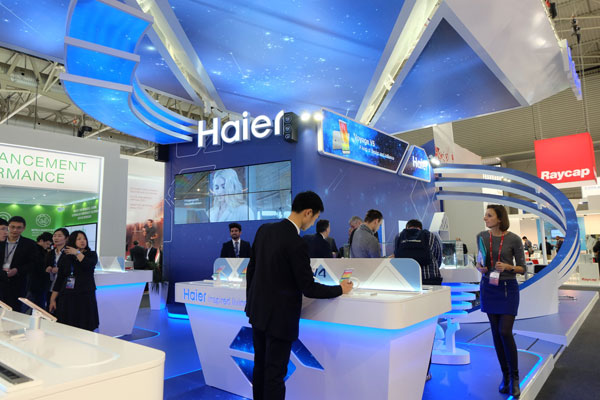 |
|
The Haier Watch, which goes on sale in the second half of 2016, can be connected to the Haier smartphone so users can remote control their phones. A view of Haier's stand at the Mobile World Congress. [Cecily Liu/chinadaily.com.cn] |
It is surprising that takeovers of international companies and brands by Chinese enterprises have received so little media coverage despite three major deals being struck in the first few weeks of January 2016 alone.
The most remarkable of the deals involved Chinese household appliance maker Haier. The Chinese company not only acquired General Electric's appliance unit for a staggering $5.4 billion, but also made clear its intent to make a mark in markets in both East and West.
Given the state of the world economy, it is important that Chinese companies gain a strong foothold in the more lucrative and competitive markets of the United States and Europe, and Haier's takeover of the American company's unit will boost their confidence in this regard.
The deal will allow Haier to use the GE brand and all its relative aspects for its appliances for the next 40 years. The immediate benefits to Haier and the Chinese economy are clear, but looking at long-term gains is perhaps even more important. GE's advanced manufacturing technology and impressive brand building provide major learning opportunities for Haier and will help it to emulate GE's global presence.
By not giving due coverage to the takeovers, media outlets have also undermined the fact that Haier appears to have outbid and out-maneuvered many other major appliance makers such as Electrolux and has its sights firmly set on US market leader Whirlpool.
Chinese companies are targeting takeovers that offer long-term learning and strategic repositioning opportunities. The Krauss-Maffei acquisition by the China National Chemical Corporation is another example in this regard. The Krauss-Maffei Group is widely recognized as one of the leading manufacturer of machines and systems for plastic and rubber production and processing.
What was really striking is that just days after the Krauss-Maffei acquisition came the news that Dalian Wanda had reached an agreement to take over Hollywood-based Legendary Entertainment for $3.5 billion, the largest Hollywood takeover to date by a Chinese company.
The size and significance of the three takeovers notwithstanding, they should not be viewed in isolation. Instead, more media coverage of this growing trend is needed, in order to present a far more balanced picture of the real Chinese economy, especially because the takeover trend is likely to grow, and the Belt and Road Initiative and Asian Infrastructure Investment Bank will help Chinese companies in their international takeover bids.
Of course, growth through acquisition is fraught with difficulties and challenges - highlighted by a 60 percent failure rate. But that is all the more reason why the majority of Chinese overseas takeovers are impressive - their targets appear to offer complementary products, markets and skills, and all have a string of successful, global brands.
It seems Chinese companies today are better equipped to manage the complex process of post-acquisition integration, not least because they retain talented professionals, and blend styles and cultural backgrounds.
It should be clear to all that Chinese companies are pursuing growth through overseas takeovers not for short-term financial gains but to build a key plank in their long-term, global brand-building process.
Let's hope media outlets will cover such takeovers more widely, as they should have done in the first place, instead of simply focusing on a few macro-economic indicators such as quarterly GDP figures, because Chinese companies are not just looking to penetrate the more lucrative European and US markets but are also on the lookout for those European and US companies and brands that would help them further penetrate the Chinese market.
The author is a visiting professor at the University of International Business and Economics in Beijing and a senior lecturer in marketing at Southampton Solent University's School of Business.

I’ve lived in China for quite a considerable time including my graduate school years, travelled and worked in a few cities and still choose my destination taking into consideration the density of smog or PM2.5 particulate matter in the region.